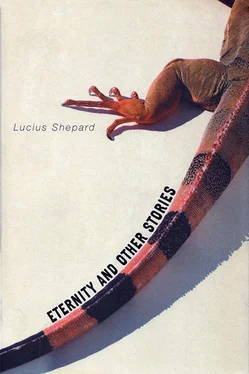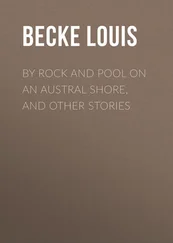Люциус Шепард - Eternity and Other Stories
Здесь есть возможность читать онлайн «Люциус Шепард - Eternity and Other Stories» весь текст электронной книги совершенно бесплатно (целиком полную версию без сокращений). В некоторых случаях можно слушать аудио, скачать через торрент в формате fb2 и присутствует краткое содержание. Город: New York, Год выпуска: 2005, ISBN: 2005, Издательство: Thunder's Mouth Press, Жанр: Фантастика и фэнтези, prose_magic, на английском языке. Описание произведения, (предисловие) а так же отзывы посетителей доступны на портале библиотеки ЛибКат.
- Название:Eternity and Other Stories
- Автор:
- Издательство:Thunder's Mouth Press
- Жанр:
- Год:2005
- Город:New York
- ISBN:978-1-560-25662-5
- Рейтинг книги:5 / 5. Голосов: 1
-
Избранное:Добавить в избранное
- Отзывы:
-
Ваша оценка:
- 100
- 1
- 2
- 3
- 4
- 5
Eternity and Other Stories: краткое содержание, описание и аннотация
Предлагаем к чтению аннотацию, описание, краткое содержание или предисловие (зависит от того, что написал сам автор книги «Eternity and Other Stories»). Если вы не нашли необходимую информацию о книге — напишите в комментариях, мы постараемся отыскать её.
“Lucius Shepard’s stories a jungles — densely alive, sometimes mysterious, often gorgeous, and always dangerous.” — Katerine Dunn, author of Geek Love
Eternity and Other Stories — читать онлайн бесплатно полную книгу (весь текст) целиком
Ниже представлен текст книги, разбитый по страницам. Система сохранения места последней прочитанной страницы, позволяет с удобством читать онлайн бесплатно книгу «Eternity and Other Stories», без необходимости каждый раз заново искать на чём Вы остановились. Поставьте закладку, и сможете в любой момент перейти на страницу, на которой закончили чтение.
Интервал:
Закладка:
Asshole, Chemayev thought, as he watched the two men cross the lot. Polutin liked to give himself intellectual airs, to think of himself as criminal royalty, and to his credit he had learned how to take advantage of society’s convulsions; but that required no particular intelligence, only the instincts and principles of a vulture. As for the new Russia, what a load of shit! Chemayev turned his eyes to the nearest of the krushovas no more than fifteen yards away, the building’s crumbling face picked out by wan flickering lights, evidence that power was out on some of the floors and candles were in use. The fluorescent brightness of the entranceway was sentried by a prostitute with bleached hair and a vinyl jacket, who paced back and forth with metronomic regularity, pausing at the end of each pass to peer out across the wasteland, as though expecting her relief. There, he thought, that was where the new Russia had been spawned. Open graves infested by the old, the desperate, the addicted, perverts of every stamp. They made the stars behind them look false, they reduced everything they shadowed. If the new Russia existed, it was merely as a byproduct of a past so grim that any possible future would be condemned to embody it.
The prospect of spending an evening with his boss, especially this one, when so much was at stake, weighed on Chemayev. He was not in the mood for Polutin’s condescension, his unctuous solicitude. But he could think of no way to avoid it. He stepped from the car and took a deep breath of the biting, gasoline-flavored Moscow air. A few hours more, and his troubles would be over. All the wormy, enfeebling pressures of the past year would be evicted from his spirit, and for the first time he’d be able to choose a path in life rather than accept the one upon which he had been set by necessity. Strengthened by this notion, he started across the lot. Each of his footsteps made a crisp sound, as if he were crushing a brittle insect underfoot, and left an impression of his sole in a paper-thin crust of ice.
Chemayev checked his pistols at the entrance to Eternity, handing them over to one of Lebedev’s young unsmiling soldiers, and descended in an elevator toward the theater that lay at the center of the complex. The empty holsters felt like dead, stubby wings strapped to his sides, increasing his sense of powerlessness—by contrast, the money belt about his waist felt inordinately heavy, as if full of golden bars, not gold certificates. The room into which the elevator discharged him was vast, roughly egg-shaped, larger at the base than at the apex, with snow white carpeting and walls of midnight blue. At the bottom of the egg was a circular stage, currently empty; tiers of white leather booths were arranged around it, occupied by prosperous-looking men and beautiful women whose conversations blended into a soft rustling that floated upon a bed of gentle, undulant music. Each booth encompassed a linen-covered table, and each table was centered by a block of ice hollowed so as to accommodate bottles of chilled vodka. The top of the egg, some thirty feet above the uppermost tier, was obscured by pale swirling mist, and through the mist you could see hanging lights—silvery, delicate, exotically configured shapes that put Chemayev in mind of photographs he’d seen of microscopic creatures found in polar seas. To many the room embodied a classic Russian elegance, but Chemayev, whose mother—long deceased—had been an architect and had provided him with an education in the arts, thought the place vulgar, a childish fantasy conceived by someone whose idea of elegance had been derived from old Hollywood movies.
Polutin’s booth, as befitted his station, was near the stage. The big man was leaning close to March, speaking energetically into his ear. Chemayev joined them and accepted a glass of vodka. “I was about to tell Niall about the auction,” Polutin said to him, then returned his attention to March. “You see, each night at a certain time… a different hour every night, depending on our host’s whim… Each night a beautiful woman will rise from beneath the stage. Naked as the day she came into the world. She carries a silver tray upon which there lies a single red rose. She will walk among the tables, and offer the rose to everyone in attendance.”
“Yeah?” March cocked an eye toward Polutin. “Then what?”
“Then the bidding begins.”
“What are they bidding for?” March’s responses were marked by a peculiar absence of inflection, and he appeared disinterested in Polutin’s lecture; yet Chemayev had the sense that he was observing everything with unnatural attentiveness. His cheeks were scored by two vertical lines as deep as knife cuts that extended from beneath the corners of his eyes to the corners of his lips. His mouth was thin, wide, almost chimpanzee-like in its mobility and expressiveness—this at odds with his eyes, which were small and pale and inactive. It was as if at the moment of creation he had been immersed in a finishing bath, one intended to add an invigorating luster, that had only partially covered his face, leaving the eyes and all that lay behind them lacking some vital essential.
“Why… for the rose, of course.” Polutin seemed put off by March’s lack of enthusiasm. “Sometimes the bidding is slow, but I’ve seen huge sums paid over. I believe the record is a hundred thousand pounds.”
“A hundred grand for a fucking flower?” March said. “Sounds like bollocks to me.”
“It’s an act of conspicuous consumption,” Chemayev said; he tossed back his vodka, poured another from a bottle of Ketel One. “Those who bid are trying to demonstrate how little money means to them.”
“There’s an element of truth in what Viktor says,” Polutin said archly, “but his understanding is incomplete. You are not only bidding for status… for a fucking flower .” He spooned caviar onto a silver dish and spread some on a cracker. “Think of a rose. Redder than fire. Redder than a beast’s eye. You’re bidding for that color, that priceless symptom of illusion.” He popped the cracker into his mouth and chewed noisily; once he had swallowed he said to March, “You see, Viktor does not bid. He’s a frugal man, and a frugal man cannot possibly understand the poetry of the auction.” He worried at a piece of cracker stuck in his teeth. “Viktor never gambles. He picks up a check only when it might prove an embarrassment to do otherwise. His apartment is a proletarian tragedy, and you’ve seen that piece of crap he drives. He’s not wealthy, but he is far from poor. He should want for nothing. Yet he hoards money like an old woman.” Polutin smiled at Chemayev with exaggerated fondness. “All his friends wonder why this is.”
Chemayev ignored this attempt to rankle him and poured another vodka. He noted with pleasure that the pouches beneath Polutin’s eyes were more swollen than usual, looking as if they were about to give birth to fat worms. A few more years of heavy alcohol intake, and he’d be ripe for a cardiac event. He lifted his glass to Polutin and returned his smile.
“To be successful in business one must have a firm grasp of human nature,” said Polutin, preparing another cracker. “So naturally I have studied my friends and associates. From my observations of Viktor I’ve concluded that he is capable of magic.” He glanced back and forth between Chemayev and March, as if expecting a strong reaction.
March gave an amused snort. “I suppose that means he’s got himself a little wand.”
Polutin laughed and clapped March on the shoulder. “Let me explain,” he said. “During the early days of glasnost , Yuri Lebedev was the strongest man in all the mafiyas . He made a vast fortune, but he also made enemies. The dogs were nipping at his heels, and he recognized it was only a matter of time before they brought him down. It was at this point he began to build Eternity.”
Читать дальшеИнтервал:
Закладка:
Похожие книги на «Eternity and Other Stories»
Представляем Вашему вниманию похожие книги на «Eternity and Other Stories» списком для выбора. Мы отобрали схожую по названию и смыслу литературу в надежде предоставить читателям больше вариантов отыскать новые, интересные, ещё непрочитанные произведения.
Обсуждение, отзывы о книге «Eternity and Other Stories» и просто собственные мнения читателей. Оставьте ваши комментарии, напишите, что Вы думаете о произведении, его смысле или главных героях. Укажите что конкретно понравилось, а что нет, и почему Вы так считаете.












